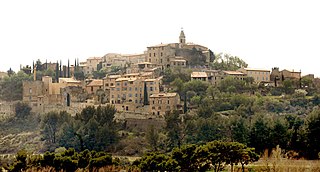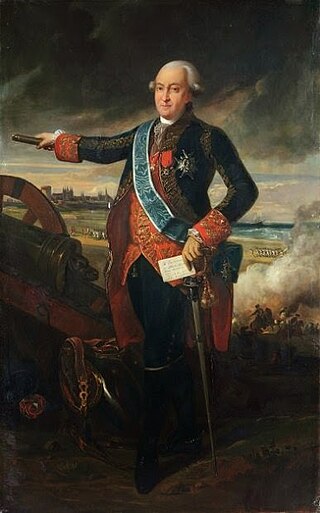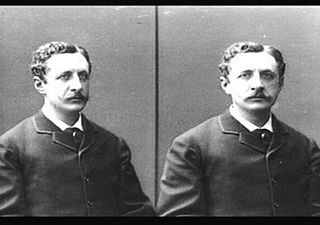Berton is a both a surname and a given name. Notable people with the name include:
Pierre is a masculine given name. It is a French form of the name Peter. Pierre originally meant "rock" or "stone" in French. It is a translation of Aramaic כיפא (Kefa), the nickname Jesus gave to apostle Simon Bar-Jona, referred in English as Saint Peter. Pierre is also found as a surname.
Pierre Berton (1920–2004) was a Canadian author of non-fiction and a well-known television personality and journalist.

Crillon-le-Brave is a commune in the Vaucluse department in the Provence-Alpes-Côte d'Azur region of Southeastern France. In 2019, it had a population of 475.

Louis des Balbes de Berton de Crillon was a French soldier, called the man without fear and, by Henry IV the brave of the brave.
Crillon may refer to:

Henri-Montan Berton was a French composer, teacher, and writer, mostly known as a composer of operas for the Opéra-Comique.

The French composer Hector Berlioz made four attempts at winning the Prix de Rome music prize, finally succeeding in 1830. As part of the competition, he had to write a cantata to a text set by the examiners. Berlioz's efforts to win the prize are described at length in his Memoirs. He regarded it as the first stage in his struggle against the musical conservatism represented by the judges, who included established composers such as Luigi Cherubini, François-Adrien Boieldieu and Henri-Montan Berton. Berlioz's stay in Italy as a result of winning the prize also had a great influence on later works such as Benvenuto Cellini and Harold en Italie. The composer subsequently destroyed the scores of two cantatas almost completely and reused music from all four of them in later works. There was a revival of interest in the cantatas in the late 20th century, particularly Cléopâtre, which has become a favourite showcase for the soprano and mezzo-soprano voice.
Lebreton, Le Breton, or LeBreton is a surname. Notable people with the surname include:

Louis des Balbes de Berton de Crillon, 1st Duke of Mahón, 2nd Duke of Crillon was a Franco-Spanish military officer who reached the rank of Captain general of the Army. He became a soldier at the age of 16 and served with distinction in the French army before transferring to the army of Spain, which was allied with France for much of the 18th century. A member of a distinguished military family, he was widely admired for his personal courage, courtesy and chivalry. By the end of his life he had risen to the highest military rank in Spain and it was said that he had served in 68 engagements.
Henry is an English male given name and an Irish and French surname, borrowed from Old French, originally of Germanic origin (Haimirich) from the elements haim ("home") and ric ("powerful"). Equivalents in other languages are Anraí (Irish), Eanruig, Enrico, Amerigo (Italian), Enrique (Spanish), Heinrich (German), Henning (Swedish), Henri, Henrik, Henrique (Portuguese), Henryk (Polish), (H)enric, Hendrik (Dutch), and Genrikh (Russian), among others.

Le congrès des rois was a 3-act French Revolutionary opera of the genre comédie mêlée d'ariettes with a libretto by De Maillot, a stage name used by Antoine-François Ève early in his career, and music by a collaborative of twelve composers. It was a satire directed against the "enemies of France". The libretto and most of the music has been lost.
Lieutenant en second was a junior officer rank in the French Royal Army prior to the French Revolution. Like most of the officer ranks in the Royal Army, it was dominated by nobles. High-ranking nobles entering military service during their teenage years would serve in the rank at ages as young as 15 or 16 years old before rapidly being promoted. One such example was Louis des Balbes de Berton de Crillon, duc de Mahon, who joined the Régiment du Roi in 1734, aged 16, as a lieutenant en second before being promoted the following year to lieutenant en premier. Lesser nobles would stay in the rank for longer, while the few commoners who had been able to become officer of fortune might remain as lieutenants en second until they died or retired.

The Hôtel d'Europe is a five star hotel located in the old historical part of Avignon, in Provence, France. It has been a hotel since 1799 and is therefore considered to be one of the oldest hotels in France.

Pierre Berton, was a French actor and playwright.
Henri François Berton called Berton fils was an early 19th-century French composer.
Henry Benoît François Darondeau was a 19th-century French composer and piano teacher.

Louis-Barthélémy Pradher was a French composer, pianist and music educator.
Dufour or Du Four or Defour is a surname. Notable people with the surname include:
The House of Balbo Bertone is a Piedmontese family that held a preeminent position in the politics of medieval and early Renaissance Chieri, a Piedmontese city republic within the Holy Roman Empire, which starting from the late eleventh century struggled for independence from its Imperial liege overlords: at various times the Bishops of Turin, the Counts of Biandrate, and the Marquis of Montferrat. As the city grew in power and prosperity, it became with its sister Republic of Asti an important centre of commerce on the trade route from Genova and Italy to France, up until the 15th century. It was then incorporated completely into the County of Savoy and lost its independence.

Alexandrine Marie Agathe Gavaudan-Ducamel was a French opera singer who sang leading soprano roles at the Opéra Comique for over 20 years. Born in Paris with the surname "Ducamel", she later married the tenor Jean-Baptiste-Sauveur Gavaudan after which she generally performed under the name Madame Gavaudan. She retired from the stage in 1822 and spent her later years in Passy where she died at the age of 68.